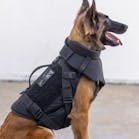When Body Armor Saves Officers...When Body Armor Saves Families
They may not often make the nightly news, but the stories behind body armor saving an officer’s life can be as moving as other more somber headlines.
Lieutenant Brian Murphy, ret. Read those four words again, but focus on “ret.” After serving over 20 years as a law enforcement officer for the Oak Creek (Wisc.) Police Department, Murphy now heads the Armor Express Saves program. During his law enforcement career, he’s worked in various areas including homeland security, emergency response, emergency management, drug enforcement, warrants, weapons of mass destruction, interrogation, investigation, evidence management, and field training. He was invited to join Armor Express in 2013. Two years later, Murphy was honored by then Vice President Joseph Biden, Jr. and Attorney General Eric Holder with a “Public Safety Officer Media of Valor” award for his exceptional courage and commitment to duty.
He was able to do so due to wearing his concealable body armor as the first responder to the 2012 Oak Creek, Wisc. Sikh Temple shooting. He miraculously survived the scene being shot a total of 18 times—15 to his body, and three stopped by his vest. I spoke to him, hoping he would share some similar stories like his.
“ Whether it’s to the officer and their family, the children, the parents—it’s a greater thing than ‘I got shot and the round stopped and there’s a bruise. Everything’s all great.’ It doesn’t work that way. ”
— Lt. Brian Murphy (ret.)
A traffic stop on Interstate 77
Ohio State Highway Patrol Trooper Sgt. Eric Knowlton was conducting a traffic stop on Ohio Interstate 77, early March 2019. After issuing a ticket for a suspended license, Knowlton put the person in the back of his patrol vehicle and returned to the driver’s seat. A commercial vehicle came in at 55 mph hitting directly into the back of the car. It took over two hours to extricate him from the vehicle, he broke bones in both legs. Witnesses report they observed the vehicle weave and never tried to break leading authorities to believe the driver was asleep.
Murphy met Knowlton at the 2019 Ohio Tactical Officers Conference and explained that the only place he didn’t have a mark on him was where the vest was. A week later Murphy and I spoke. He says, in retrospect, “Everyday, if you think about it, you’re just parked—we’re really just sitting there.”
In a surprising turn of events, the suspect in the back seat was fine. Knowlton turned around to check, but all he saw was the bottom of their foot as they crawled out the back window.
Hiding under a pile of clothes
In October 2017, Sequoyah County (Okla.) Deputy Christian Goode was on the search for Phillip Trammell, a sex-offender with outstanding warrants. After gaining permission to enter the premises, the search led into a room with laundry covering the mattress and floor.
Goode had a suspicion that the suspect was hiding on the mattress. A few kicks revealed what he believed to be some skin and quickly moved back eight feet and directed him to show his hands.
Trammell jumped. Began shouting, his body language ready to fight, and reached for a knife. They were four to five feet apart.
Goode was stabbed through the vest and into his shoulder, stopping just one millimeter from his chest cavity. The vest’s panel, according to Murphy, prevented the knife from puncturing Goode’s lung and causing more serious injury. Reportedly, Trammel struck Goode a third time below his right chest—now with the knife stuck in his Quantum ballistic armor vest. All injuries were non-life threatening.
Giving back
Murphy knows first-hand the trauma that’s involved, both personal and professional. Having a network of people sharing a similar experience can be a great benefit in the recovery process.
In the past, Armor Express has invited officers and their families to a retreat just outside of Traverse City, Mich. Officers, spouses and kids alike were able to meet and talk in a unique community. People were flown in, entertained, and fed. Some treated it as a sort of vacation. “Members watch the kids run around, everyone’s playing volleyball—having a good time. People open up and know that there are other people that could help with the experience,” explains Murphy. They’ve run two of these retreats so far. Murphy hopes to plan another.
“We learned a lot just by talking to the families,” he says. “I know what my family went through, once you start to realize that this was a traumatic event, that your life as you know it has changed.”
He spoke further on how these situations change the day’s reality. Explaining the scenario while on the phone, a lump caught my throat. “If you’re doing the job and you hypothetically get shot twice but even though you might be fine, your kids are going to know what happened. Your kids are going to know that someone shot you. I didn’t necessarily think about it before because they hadn’t experienced it firsthand.”
Murphy continues, “Like most people, you read it, you see it, that’s one thing, but living through it is entirely different. It’s like you’re a superhero. You’re in the outfit, you fight crime, you fight evil, but then when something happens, you’re a human again and that’s a hard thing sometimes.”
Officers in the Armor Express Saves program are thought of as family. Murphy speaks with every officer, some who have PTSD and advises them to seek professional help. Encouraging them to not wait, “the longer you wait, the more it’s going to frustrate you and the worse it’s going to get.”

Jonathan Kozlowski
Jonathan Kozlowski was with Officer.com, Law Enforcement Technology, and Law Enforcement Product News from August 2006 to 2020.
As former Managing Editor for Officer Media Group, he brought a dedicated focus to the production of the print publications and management of the Officer.com online product and company directory. You can connect with Jonathan through LinkedIn.
Jonathan participated as a judge for the 2019 and 2020 FOLIO: Eddie & Ozzie Awards. In 2012, he received an APEX Award of Excellence in the Technology & Science Writing category for his article on unmanned aerial vehicles (UAVs) in police work, aptly titled "No Runway Needed".



